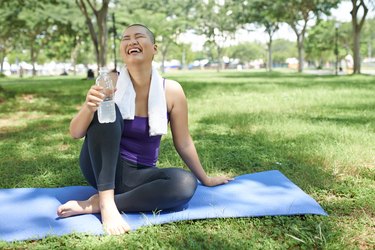
Will drinking cold water after a workout help you or hurt you? The few clinical studies on this topic show that drinking cold water after exercising may help lower your core body temperature more quickly, and you might naturally drink more water when it's cold.
Tip
Although clinical trials on this topic are limited, the few available studies indicate that exercisers tend to drink more water when it's cold, and having cold water after a workout may help you decrease your core temperature more quickly. But in most cases, the most important thing to do is drink more water — at any temperature — when you feel thirsty.
Video of the Day
The Importance of Hydration
First, a note on the importance of drinking water, no matter what temperature it's at. As the Mayo Clinic explains, water makes up roughly 60 percent of your body weight and is responsible for everything from eliminating waste to regulating your body temperature and cushioning your joints. Every cell, tissue and organ in your body needs water to maintain its proper function.
Video of the Day
Although expert recommendations for water intake have varied throughout the years, the Mayo Clinic relays a suggestion of about 15.5 cups per day for men and 11.5 cups per day for women, with around 20 percent of that coming from watery foods (for example, fruits and vegetables). However, you may need more water if you sweat a lot, whether that's from exercising or simply from heat and humidity.
Because water needs do vary, for most people thirst is your best guide of how much to drink. If you want a more specific recommendation on how much water (of any temperature) to drink when you work out, the American College of Sports Medicine provides it in the July/August 2013 issue of its Health and Fitness Journal.
They say to start by making sure you're adequately hydrated before exercising. During your workout, drink only when you're thirsty — and no more than 800 milliliters (about 3.4 cups) per hour, barring extraordinary environmental conditions that might affect your need for water.
During prolonged exercise, you may need additional electrolytes, which are the minerals that help your body actually make use of the water you take in.
Why is there a cap on recommended water intake? As explained by Harvard Health Publishing, the very public push for athletes to "drink before they become thirsty" has created a new problem: overhydration, which can pose health risks of its own.
In an older but notable study published in the April 2005 issue of the New England Journal of Medicine, Harvard-based researchers found that 13 percent of runners in the Boston marathon had some degree of hyponatremia, an imbalance of electrolytes due to overhydration.
Tip
Water may be helpful for weight loss. As noted in a study of more than 18,000 subjects that was published in the October 2016 issue of the Journal of Human Nutrition and Dietetics, a 1- to 3-cup increase could decrease calorie intake by as much as 200 calories per day. That's enough to translate to losing — or gaining — more than 2 pounds of body fat per month.
Drinking Cold Water After a Workout
What about water temperature? In a May 2018 analysis published by the Gatorade Sports Science Institute, the researchers affirmed that drinking cold drinks before exercise, as opposed to during exercise, is more effective at lowering body temperature.
That might help you work out for longer without overheating, especially in hot or humid conditions. But the effect is limited. Drinking too many cold fluids will cause your body to reflexively shiver, which warms you back up again.
The same authors also note that drinking cold water during exercise may help lower your core temperature and reduce fluid lost through sweating. They speculate that drinking cold water after you work out may be particularly effective for helping to lower body temperature. What little clinical research there is on this topic seems to bear that conclusion out, but further study is needed.
This may be especially useful for athletes who wear uniforms that keep them from cooling their bodies well by sweating — for example, ice hockey and American football players — or anyone with a physiological disruption to their body's ability to sweat.
If nothing else, drinking cool water might make it easier to stay hydrated. In a 2013 issue of the International Journal of Clinical and Experimental Medicine, researchers evaluated a pool of six healthy subjects.
Although the study was very small, it notes the interesting finding that after mild dehydration through exercise in a hot and humid room, subjects spontaneously drank significantly more cool water (16 degrees Celsius, or 60 degrees Fahrenheit) than warm water. The next highest intake was of cold water (5 degrees Celsius, or 41 degrees Fahrenheit).
So if you prefer drinking ice water after a workout to drinking cool water, you're in good company — and either type of water might make it easier for you to stay hydrated.
Read more: How Can I Tell When My Body Is Hydrated?
- Journal of Human Nutrition and Dietetics: "Plain Water Consumption in Relation to Energy Intake and Diet Quality Among US Adults, 2005-2012"
- Harvard Health Publishing: "Trade Sports Drinks for Water"
- New England Journal of Medicine: "Hyponatremia Among Runners in the Boston Marathon"
- International Journal of Clinical and Experimental Medicine: "The Effect of Water Temperature and Voluntary Drinking on the Post Rehydration Sweating"
- Gatorade Sports Science Institute: "Cold Water and Ice Slurry Ingestion for Reducing Body Temperature During Exercise in the Heat"
- Mayo Clinic: "Water: How Much Should You Drink Every Day?"
- ACSM's Health and Fitness Journal: "Exercise and Fluid Replacement"